|
|
|
Sort Order |
|
|
|
Items / Page
|
|
|
|
|
|
|
| Srl | Item |
| 1 |
ID:
138461
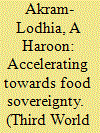

|
|
|
|
|
| Summary/Abstract |
Rural social movements and urban food activists have sought to build food sovereignty because it has the potential to be the foundation of an alternative food system, transcending the deep-seated social, economic and ecological contradictions of the global food economy.
However, continuing to build food sovereignty requires changes to global and local food systems that have to be undertaken in the messy reality of the present. This article therefore presents a series of wideranging, politically challenging but ultimately feasible interventions
that are necessary but not sufficient conditions for its realisation.
|
|
|
|
|
|
|
|
|
|
|
|
|
|
|
|
| 2 |
ID:
138459
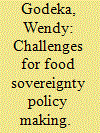

|
|
|
|
|
| Summary/Abstract |
Food sovereignty policy initiatives face significant challenges in their quest to be approved. This article examines the case of Nicaragua’s Law 693, the Law of Food and Nutritional Sovereignty and Security, which was passed in 2009. Drawing on empirical research, the article details the initial stages of the policy-making process – from the origins and development of the proposal for a food sovereignty law to its introduction and initial deliberation by the National Assembly to the breakdown in the approval process because of conflict over the law’s content. Using theoretical insights from the food sovereignty and food security policy literature, Law 693 is examined, noting key limitations food sovereignty faced during the policy-making process. The study finds that the strength and force of national food sovereignty discourses, the ability of food sovereignty advocates to convince others of the legitimacy and viability of the food sovereignty approach, and the willingness of the state to create the necessary conditions to foster food sovereignty are all important factors when evaluating the potential for food sovereignty to be successfully adopted into public policies.
|
|
|
|
|
|
|
|
|
|
|
|
|
|
|
|
| 3 |
ID:
138464
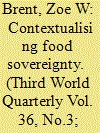

|
|
|
|
|
| Summary/Abstract |
As food sovereignty spreads to new realms that dramatically diverge
from the agrarian context in which it was originally conceived, this
raises new challenges, as well as opportunities, for already complex
transnational agrarian movements. In the face of such challenges calls
for convergence have increasingly been put forward as a strategy for
building political power. Looking at the US case, we argue that historically
rooted resistance efforts for agrarian justice, food justice and
immigrant labour justice across the food system are not only drawing
inspiration from food sovereignty, but helping to shape what food
sovereignty means in the USA. By digging into the histories of these
resistance efforts, we can better understand the divides that exist as
well as the potential for and politics of convergence. The US case
thus offers important insights, especially into the roles of race and
immigration in the politics of convergence that might strengthen the
global movement for food sovereignty as it expands to new contexts
and seeks to engage with new constituencies.
|
|
|
|
|
|
|
|
|
|
|
|
|
|
|
|
| 4 |
ID:
138455
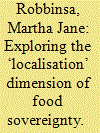

|
|
|
|
|
| Summary/Abstract |
The ‘localisation’ narrative is at the heart of food sovereignty in theory and practice, in reaction to the ‘distance’ dimension in the dominant industrial food system. But while it is a central element in food sovereignty, it is under-theorised and largely unproblematised. Using the theoretical concepts of food regime analysis, uneven geographical development and metabolic rift, the author presents an
exploratory discussion on the localisation dimension of food sovereignty, arguing that not all local food systems are a manifestation of food sovereignty nor do they all help build the alternative model that food sovereignty proposes. The paper differentiates local food systems by examining character, method and scale and illustrates how local food systems rarely meet the ideal type of either food sovereignty or the capitalist industrial model. In order to address five forms of distance inherent in the global industrial food system, localization is a necessary but not sufficient condition for food sovereignty. A more comprehensive food sovereignty needs to be constructed and may still be constrained by the context of capitalism and mediated by the social movements whence it comes.
|
|
|
|
|
|
|
|
|
|
|
|
|
|
|
|
| 5 |
ID:
138457
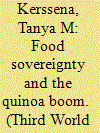

|
|
|
|
|
| Summary/Abstract |
In the last three decades, quinoa has gone from a globally obscure food to an internationally traded product with rising global consumer demand. This transformation has had complex social and ecological impacts on the indigenous agropastoral communities of the southern Altiplano region of Bolivia. This article analyses the role that global quinoa markets have played in the repopulation and revitalisation of this region, previously hollowed out by out-migration. Yet, it also points to a number of local tensions and contradictions generated or magnified by this process, as peasants struggle to harness the quinoa boom as a force of ‘sustainable e-peasantisation’ and ‘living well’. Finally, the article suggests that the food sovereignty movement should place greater emphasis on examining the culturally and historically specific challenges facing re-peasantisation in particular places.
|
|
|
|
|
|
|
|
|
|
|
|
|
|
|
|
| 6 |
ID:
138458
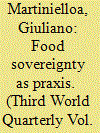

|
|
|
|
|
| Summary/Abstract |
This article critically reflects upon conceptual and analytical questions that affect the practical implementation of food sovereignty in Uganda, a country often labelled as the potential breadbasket of Africa. It proposes to look at the integration of food and land-based social relations in the context of localised and historical–geographical specificities of livelihood practices among Acholi peasants in northern Uganda as a way to ground the concept. It argues that many of the organising principles at the core of the food sovereignty paradigm are inscribed in the socio-cultural and ecological practices of peasant populations in northern Uganda. Yet these practices are taking place in an increasingly adverse national and international environment, and under circumstances transmitted from the past, which enormously challenge their implementation and jeopardise the future of food security and sovereignty prospects for peasant agriculture.
|
|
|
|
|
|
|
|
|
|
|
|
|
|
|
|
| 7 |
ID:
138456
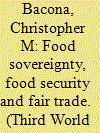

|
|
|
|
|
| Summary/Abstract |
The relationships among trade, food sovereignty and food security are underexplored. I conducted qualitative research with an influential cooperative to identify lessons that food sovereignty (FS) scholars could learn from fair trade and food security, and explore linkages among these projects. First, most co-op leaders and farmers view these projects as complementary, not contradictory. Second, state-led agrarian reforms and co-ops increase access to land, markets, water, forests and pasture, which have reduced – but not eliminated – seasonal hunger. Third, these diversified fair trade coffee-exporting smallholders could be part of a FS agenda. However, the split in fair trade suggests that only specific versions of fair trade are compatible with FS. Fourth, capable cooperatives can enhance fair trade and FS goals, and food security outcomes. Fifth, organised smallholders resisting the fair trade split could learn from the FS social movement’s strategies. Food insecurity remains a persistent challenge to both approaches.
|
|
|
|
|
|
|
|
|
|
|
|
|
|
|
|
| 8 |
ID:
138463
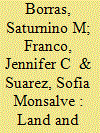

|
|
|
|
|
| Summary/Abstract |
Land and food politics are intertwined. Efforts to construct food
sovereignty often involve struggles to (re)constitute democratic
systems of land access and control. The relationship is two-way:
democratic land control may be effected but, without a strategic
rebooting of the broader agricultural and food system, such
democratisation may fizzle out and revert back to older or trigger
newer forms of land monopoly. While we reaffirm the relevance of
land reform, we point out its limitations, including its inability to
capture the wide array of land questions confronting those implicated
in the political project of food sovereignty. Our idea of the land
framework of food sovereignty, described as ‘democratic land
control’ or ‘land sovereignty’, with working peoples’ right to land at
its core, is outlined, with a normative frame to kick-start a debate and
possible agenda for future research.
|
|
|
|
|
|
|
|
|
|
|
|
|
|
|
|
| 9 |
ID:
138460
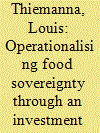

|
|
|
|
|
| Summary/Abstract |
A central question in the current debate on food sovereignty concerns the concepts and approaches to assist and frame the operationalisation of its agendas for peasant-based agricultural development. Another is the search for inclusive methods and language to discuss these operational, ‘territorial’ agendas with potential constituents. This paper argues that both questions call for an investment lens, a complementary approach within food sovereignty that proposes and discusses investments rather than political demands. Decolonial epistemology w ill treat existing investment lenses critically; however, in doing so it also urges new perspectives on what constitutes investment, the categories of cost involved, and the measurements employed. In following the rationale of investment in agro-ecological theory and practice, the paper next argues that the reconstruction of ‘big push theory’ outside the ‘modernisation’ paradigm that once produced it is possible, and that formulation and discussion of big push strategies could reclaim a space within critical agrarian studies. Big push theory offers a frame for the consistent critique of ‘silver bullet’ development projects through the study of negative feedback loops; and a frame for the study of positive feedback loops, which crucially underlie the proposals of food sovereignty movements for broad, integrated changes
in agrarian systems.
|
|
|
|
|
|
|
|
|
|
|
|
|
|
|
|
| 10 |
ID:
138462


|
|
|
|
|
| Summary/Abstract |
The vision of food sovereignty calls for radical changes in agricultural,
political and social systems related to food. These changes also
entail addressing inequalities and asymmetries of power in gender
relations. While women’s rights are seen as central to food sovereignty,
given the key role women play in food production, procurement
and preparation, family food security, and food culture, few
attempts have been made to systematically integrate gender in food
sovereignty analysis. This paper uses case studies of corporate agricultural
expansion to highlight the different dynamics of incorporation
and struggle in relation to women’s and men’s different position,
class and endowments. These contribute to processes of social differentiation
and class formation, creating rural communities more complex
and antagonistic than those sketched in food sovereignty
discourse and neo-populist claims of peasant egalitarianism, cooperation
and solidarity. Proponents of food sovereignty need to address
gender systematically, as a strategic element of its construct and not
only as a mobilising ideology. Further, if food sovereignty is to have
an intellectual future within critical agrarian studies, it must reconcile
the inherent contradictions of the ‘we are all the sa
|
|
|
|
|
|
|
|
|
|
|
|
|
|
|
|
|
|
|
|
|